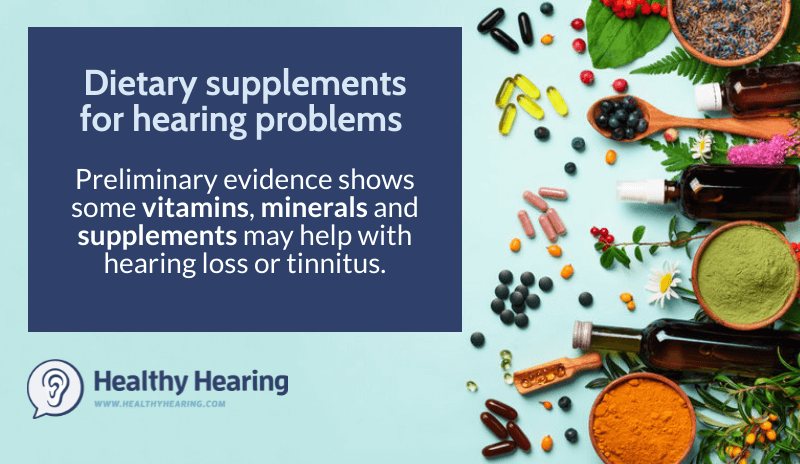
Contributed by Madeleine Burry
Last updated
Browse through the vitamin aisle in the pharmacy—or peruse page after page of offerings in online stores—and you’ll see a wide variety of supplements and herbal remedies available, often with bold statements about the products’ effects.
How much merit do these claims have when it comes to hearing?
Here, a look at what supplements may offer when it comes to safeguarding your hearing and counteracting hearing loss—along with the limitations of these over-the-counter products.
Diet matters
Here’s one truth: What you eat can affect your overall health—and the health of your ears.
“Accumulating evidence suggests that a healthier diet, such as one that resembles the Mediterranean diet or DASH (Dietary Approaches to Stop Hypertension) diet, may help protect against aging-related hearing loss,” Dr. Sharon G. Curhan, MD, and director of The Conservation of Hearing Study, says. Part of this is because these diets are better for your blood circulation, and, in turn, healthy blood flow is important for healthy hearing.

But vitamin intake plays a role here, too.
“Our NIDCD-funded research shows that individuals with higher intakes of certain vitamins…whether from diet or supplements, appear to be at lower risk for developing hearing loss,” she says. (NIDCD is the National Institute on Deafness and Other Communication Disorders.)
That is: Your nutrient intake may help safeguard your hearing.
“Eating a healthy diet and adequate nutrient intake can help protect against a number of adverse health outcomes and possibly could also help protect against progression of hearing loss,” Dr. Curhan says.
In-depth: Diet and hearing loss
To learn more, see: Can a healthy diet reduce your risk of hearing loss? Here’s what the research says.
Emerging area of research – the impact of supplements
If what you eat affects hearing, it stands to reason that taking supplements might also make a difference, whether your goal is to protect your hearing or counteract hearing loss or other ear issues.
But the research simply isn’t there yet to make a one-to-one connection between supplements and hearing.
“Currently there isn’t enough evidence to make clinical recommendations regarding the use of vitamins or supplements for hearing protection,” Dr. Curhan says. Furthermore, she adds, “more evidence is needed to determine whether additional intake (i.e. over and above the standard recommended doses) may influence hearing health.”
That said, there are some vitamins, minerals, herbs and other dietary supplements that potentially help reduce the risk of hearing loss and tinnitus:
Vitamins and minerals
Folate
Folate is a B vitamin that your body uses to make DNA and for cell division, according to the National Institutes of Health Office of Dietary Supplements (ODS). Many foods are a natural source of folate—nuts, beans, and vegetables, to name a few. Plus, most breads and cereals are fortified with folic acid, a synthetic form of the vitamin.
Because it’s so common, most people get enough folate through their diet, per the ODS.
Through Dr. Curhan and her team’s research, they found that people with a higher intake of folate “appear to be at a lower risk for developing hearing loss.”
For instance, in a 2010 study published in Otolaryngology–Head and Neck Surgery by Dr. Curhan and others found that for men who were age 60 or older, “total folate intake was associated with a reduced risk of hearing loss.”
That mirrors other studies around folate.
For instance, in a randomized clinical trial in the Netherlands, supplementing with folic acid “slowed the decline in hearing of the speech frequencies associated with aging.” Impressive, but note that those effects may not be as meaningful for Americans, who unlike the study participants, have ready access to foods that are fortified with folic acid.
Other B vitamins
Other B vitamins may also be of interest when it comes to ear health. For instance, babies with a vitamin B6 deficiency may experience abnormally acute hearing, per the ODS. And vitamin B12 may be important as well. An older study in the American Journal of Clinical Nutrition concludes that insufficient vitamin B12 (along with low folate) “may be associated with age-related auditory dysfunction.”
It isn’t clear how long someone would need to take a vitamin B12 supplement to benefit from it. A 2020 study looked at the medical records of 117 patients with sudden sensorineural hearing loss who took supplemental B12 plus adenosine triphosphate (ATP) for different lengths of time (less than 2 months to 4+ months). The results showed that some patients recovered some of their hearing, but those who initially had more severe hearing loss didn’t do as well. However, the length of time they took B12 and ATP didn’t seem to influence overall hearing improvement.
Vitamin B12 may also be helpful treating chronic tinnitus for people with a deficiency in the vitamin, according to a 2016 study published in the journal Noise and Health.
Carotenoids
Carotenoids, such as beta-carotene, are a yellow, red, or orange substance found in plants as well as fruits, grains, and oils, according to the National Cancer Institute. For an example, think of the hue of carrots and sweet potatoes. They’re both an antioxidant and a provitamin (aka something that converts into a vitamin—in this case, carotenoids can convert into vitamin A within your body).
A higher level of carotenoid intake may reduce your risk for hearing loss. For instance, in a 2015 study published in the American Journal of Clinical Nutrition (Dr. Curhan is one of the authors), having a higher intake of certain carotenoids (as well as folate) was linked with a lower risk of hearing loss.
A 2015 clinical trial tested if beta-carotene, along with other vitamins and selenium, help people with sudden sensorineural hearing loss. One group of patients took the supplements in addition to standard treatments, such as steroids. Another control group only received the standard treatments. After a month, the group who took the beta-carotene and other supplements had better hearing improvement than the control group.
Omega-3

lower rates of hearing loss, research shows.
You can only get omega-3 fatty acids from things you eat (that is, your body can’t produce them on your own) and these fatty acids have a number of important functions in organs and systems in your body, from your immune system to your heart, according to the ODS.
Omega-3s are present in fish, which are often a star player in the Mediterranean diet, which Dr. Curhan mentions help protect against age-related hearing loss.
A 2010 study published in the American Journal of Clinical Nutrition notes an inverse association between a high intake of omega-3 polyunsaturated fatty acids and hearing loss (as in, the more omega-3s people ate, the lower the rate of hearing loss). As the study authors write, incorporating omega-3s into a person’s diet “could prevent or delay the development of age-related hearing loss.”
Research from Dr. Curhan and her team, published in 2014, found that eating fish regularly was associated with a lower risk of hearing loss in women.
If eating fish isn’t your preference, many people opt to get omega-3 fatty acid through fish oil supplements.
Zinc
The mineral zinc may be helpful when it comes to tinnitus—but only for people who have a zinc deficiency, according to Tinnitus Today. That is, if you’re low on zinc (which is more common if you’re a vegetarian, have alcohol use disorder, or have certain digestive disorders, per the ODS), taking zinc may be helpful for reducing your tinnitus symptoms.
But if you have normal zinc levels, supplementing won’t make a difference when it comes to your tinnitus.
Magnesium
Another mineral, magnesium, appears to particularly improve low-tone hearing when added to steroid treatment in people with sudden hearing loss, according to a small trial from 2004.
Magnesium also may help reduce the severity of tinnitus symptoms, according to one small study. More research is needed, but for now, magnesium is one of the most widely marketed supplements (along with zinc) for reducing tinnitus symptoms per the Australian Journal of General Practice.
Herbal remedies and other supplements for hearing loss and ear ringing
Vinpocetine
First, a definition: vinpocetine (or VPC) is similar to a compound found in the periwinkle plant, according to Memorial Sloan Kettering Cancer Center (MSKCC). Preliminary studies have examined this compound for its potential beneficial effects against memory loss, cancer, and Alzheimer’s disease, per MSKCC.
One year-long clinical study published in 2021 in the Journal of Pharmacological Sciences examined the effects of VPC as a treatment for acquired sensorineural hearing loss (meaning hearing loss that wasn’t present at birth but developed later) and concluded that it “helps to stop hearing impairment and even improve hearing.”
Ginseng
And what about ginseng? The well-known plant has been used for centuries in traditional Chinese medicine (TCM), according to Mount Sinai. It’s an incredibly popular herbal remedy thought to promote heart health, reduce stress, and a whole laundry list of other diseases.
And this plant may also help with hearing. One 2019 review calls out that clinical studies (albeit small ones that often lack a proper control group) have shown that ginseng and other TCM herbs have reduced tinnitus symptoms and improved the hearing threshold for people with sensorineural hearing loss.
Ginsenoside Rc, an active compound in Panax ginseng, appears to help protect cochlear hair cells and reduce inflammation in mice, according to a 2023 study. The compound could potentially be beneficial for preserving hearing, but clinical research is needed to confirm this.
Coenzyme Q10 (CoQ10)
This antioxidant that your body makes on its own decreases with age, per the Mayo Clinic. Research suggests that it may reduce blood pressure, decrease migraines, improve physical performance, and deliver other benefits as well, according to the Mayo Clinic.
And when it comes to hearing, a 2010 study found that supplementing with CoQ10 “may have beneficial effects in the treatment of sudden sensorineural hearing loss.”
Ginkgo biloba
Ginkgo biloba, which derives from a tree, is a bestseller in the supplement aisle, according to Mount Sinai. And, it’s “the most studied dietary supplement in tinnitus treatment,” according to a 2018 out-of-print article in Tinnitus Today, a publication from the American Tinnitus Association (ATA).
Despite all this research, there’s no clarion call to turn to this supplement for tinnitus, since some clinical trials have shown a positive effect from taking it, while others have shown no effect at all, per Tinnitus Today.
A 2022 Cochrane review analyzed 12 studies totaling more than 1,900 participants. The investigators were unable to draw any meaningful conclusions as to the potential benefits or harms of ginkgo for tinnitus when compared to placebo.
Melatonin
Tinnitus and sleep have a rough relationship: the ringing can make it hard to ease into rest, while not getting enough sleep can increase the symptoms. Melatonin is a hormone found in your brain that’s important to regulating your circadian clock, which helps determine many body functions, including when you sleep.
Small wonder, then, that melatonin is a popular supplement for people who struggle to fall asleep. When it comes to tinnitus, taking melatonin may be helpful, per Kaiser Permanente.
More: Tinnitus supplements: Helpful or harmful?
One supplement to potentially limit
Because they’re available over the counter, it’s tempting to think of supplements as being no big deal. But while taking them can have positive effects, it’s not always the case that they’re free from harm. Along with being pricey and sometimes leading to harmful interactions with medications and other conditions, some supplements may harm ear health.
“Our findings that very high intake of vitamin C may increase the risk of hearing loss suggest that ‘more’ is not always ‘better,’” Dr. Curhan says.
This is true for one of the most familiar vitamins—vitamin C, which is found in many fruits. Many people think it can boost the immune system, but it is possible to take too much.
“Our findings that very high intake of vitamin C may increase the risk of hearing loss suggest that ‘more’ is not always ‘better,’” Dr. Curhan says.
Supplements are promising—but no silver bullet
Because lots of things besides diet affect hearing, and no vitamins are directly linked to hearing health, eating a balanced diet is still the best way to get the nutrients your body needs to function effectively.
And, it’s worth noting the clinical guidelines of the American Academy of Otolaryngology–Head and Neck Surgery Foundation on supplements as a tinnitus treatment: “Clinicians should not recommend Ginkgo biloba, melatonin, zinc, or other dietary supplements for treating patients with persistent, bothersome tinnitus.”
Most members of the group responsible for developing the guidelines felt supplements had a greater chance of doing harm than good.
So where does that leave you? Your best bet is to consult with your family doctor before adding any vitamins or supplements to your diet for hearing loss or tinnitus. If you have any concerns about your hearing, contact a hearing care professional near you.
You may also want to read up on these lifestyle tips to prevent hearing loss.
More: Clinical trials on hearing loss – how to participate
Note: This piece was medically reviewed in September 2023 by Dr. Patricia Weiser, a licensed pharmacist and medical writer. She obtained her Doctor of Pharmacy degree at the University of Pittsburgh.